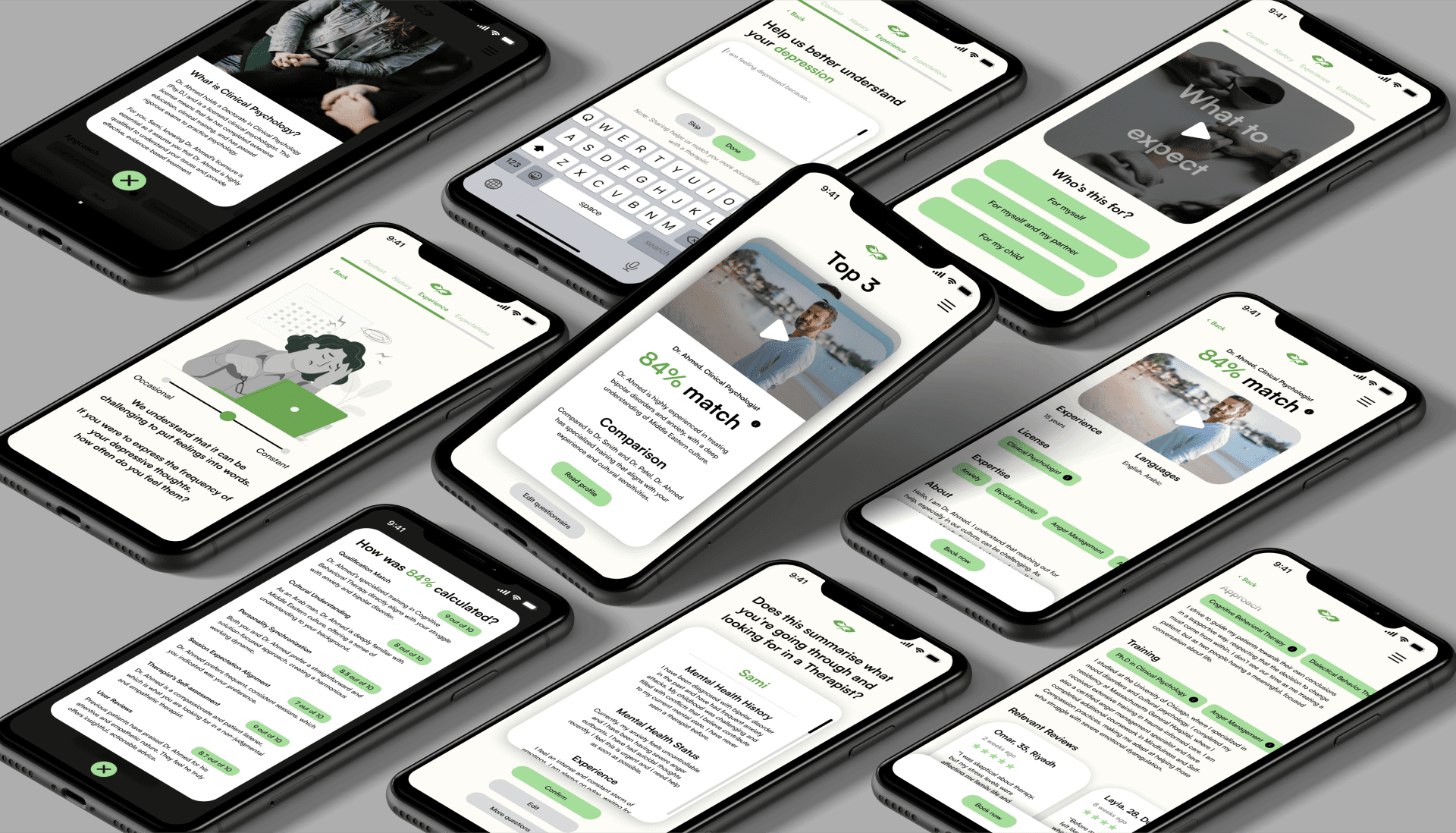

Fostering Continuity
in Therapy
Company
Personal Project
Role
User Research;
UX/UI Design
Problem
BetterHelp is the global leader in online therapy with 30,000 Therapists and 2.5 million Patients.
However, the surge in popularity hides an unsettling truth…
A jaw-dropping 20-57% of patients drop-out just after one session.
Whilst specific stats for BetterHelp remain behind closed doors, the sea of reviews online paints a telling picture.
So, how can we…
reduce patient dropout rates after one session?

Research Process

...to understand the goals, needs, and painpoints of Betterhelp patients

...to understand the goals, needs, and painpoints of Betterhelp patients

...to understand the goals, needs, and painpoints of Betterhelp patients

...to understand the goals, needs, and painpoints of Betterhelp patients

...to understand the goals, needs, and painpoints of Betterhelp patients
Interviews with Patients
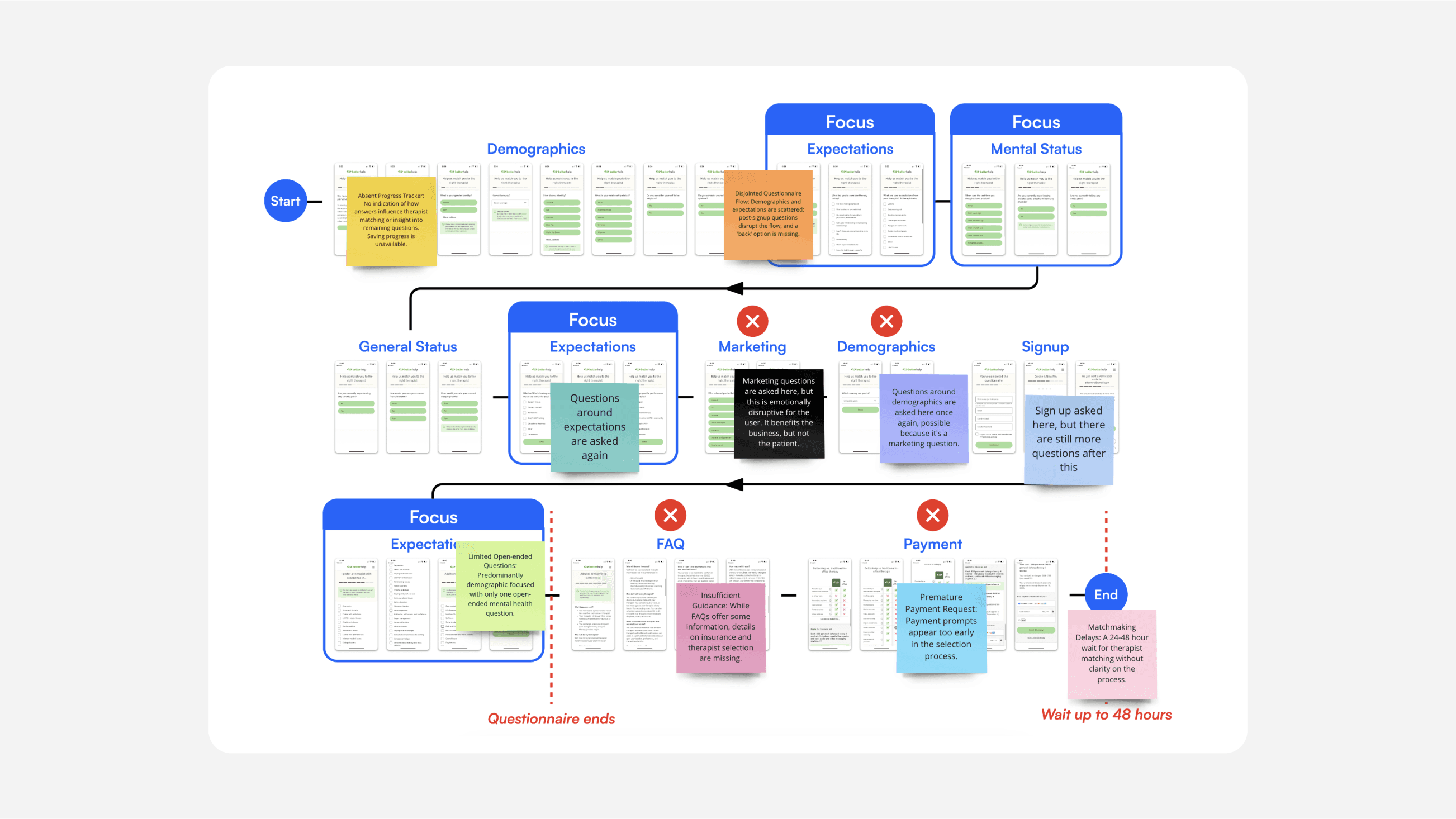
...to go through the current process to identify points of friction as well as opportunities for improvement

...to go through the current process to identify points of friction as well as opportunities for improvement

...to go through the current process to identify points of friction as well as opportunities for improvement

...to go through the current process to identify points of friction as well as opportunities for improvement

...to go through the current process to identify points of friction as well as opportunities for improvement
Analysing User Journey
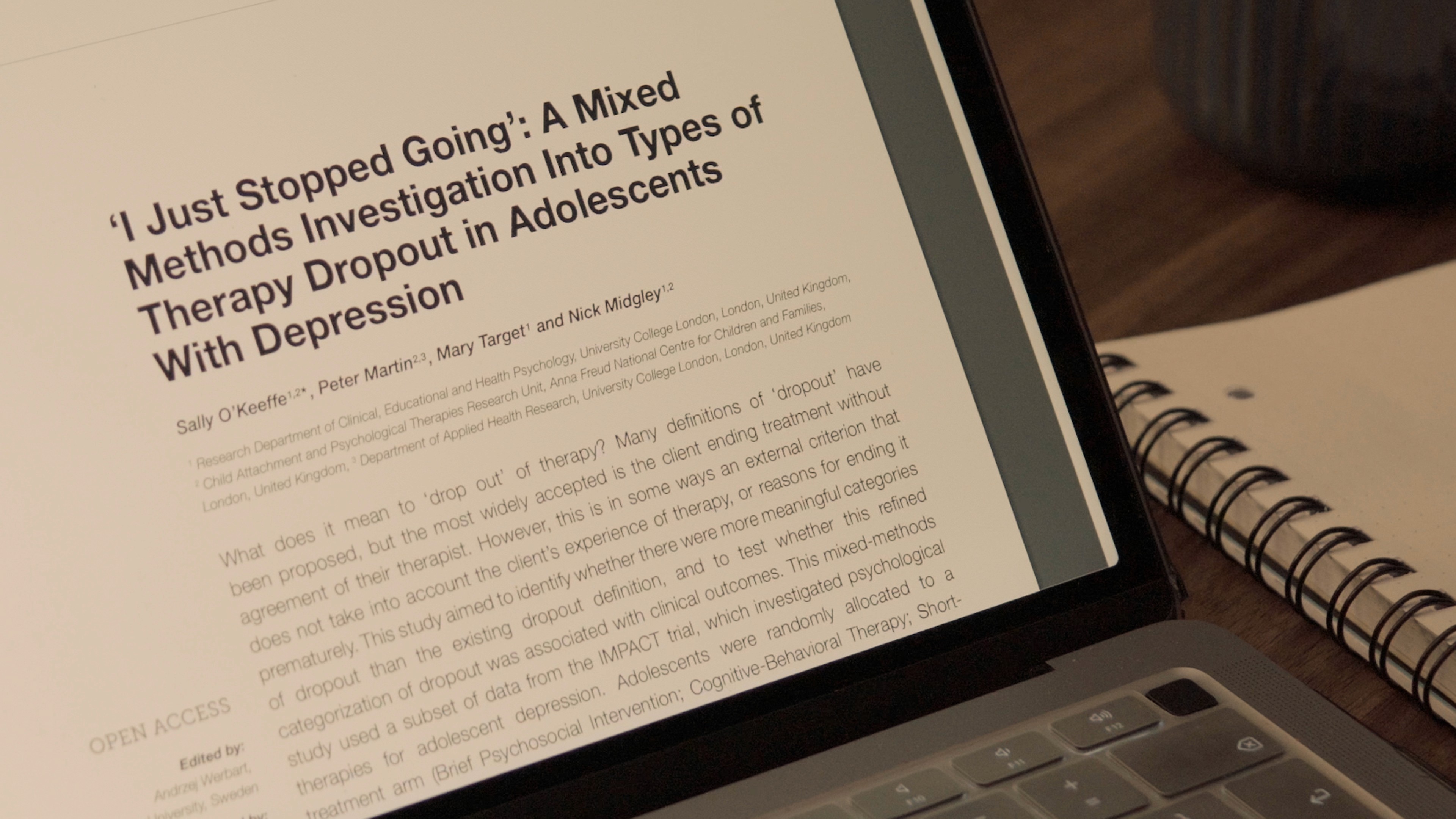
...to understand the reasons for dropping out, and how it affects the way we look at the problem

...to understand the reasons for dropping out, and how it affects the way we look at the problem

...to understand the reasons for dropping out, and how it affects the way we look at the problem

...to understand the reasons for dropping out, and how it affects the way we look at the problem

...to understand the reasons for dropping out, and how it affects the way we look at the problem
Literature Reviews
What I
found
What I found
There's a need to better manage expectations before the first session because first-time patients often enter with unclear but high expectations.
For instance, patients need to to pay an upfront of $240-360 for four weeks before even viewing a single therapist's profile. They must also wait 24-48 hours to see who they're matched with. This upfront risk and lack of clarity on return sets them up for disappointment.
There's a need to better manage expectations before the first session because first-time patients often enter with unclear but high expectations.
For instance, patients need to to pay an upfront of $240-360 for four weeks before even viewing a single therapist's profile. They must also wait 24-48 hours to see who they're matched with. This upfront risk and lack of clarity on return sets them up for disappointment.
Supporting Insights
Supporting Insights
Supporting Insights
What it meant
What it meant
Improve Transparency: Uncertainty and long-waiting times creates mistrust; I needed to find ways to lower people's guard.
Manage Expectations: Disappointment is felt when expectations are not met; I needed to find ways to manage expectations.
Improve Transparency: Uncertainty and long-waiting times creates mistrust; I needed to find ways to lower people's guard.
Manage Expectations: Disappointment is felt when expectations are not met; I needed to find ways to manage expectations.

Coming up with ideas
Coming up with ideas
Before
Patients pay
upfront and wait up to 48 hours for a match
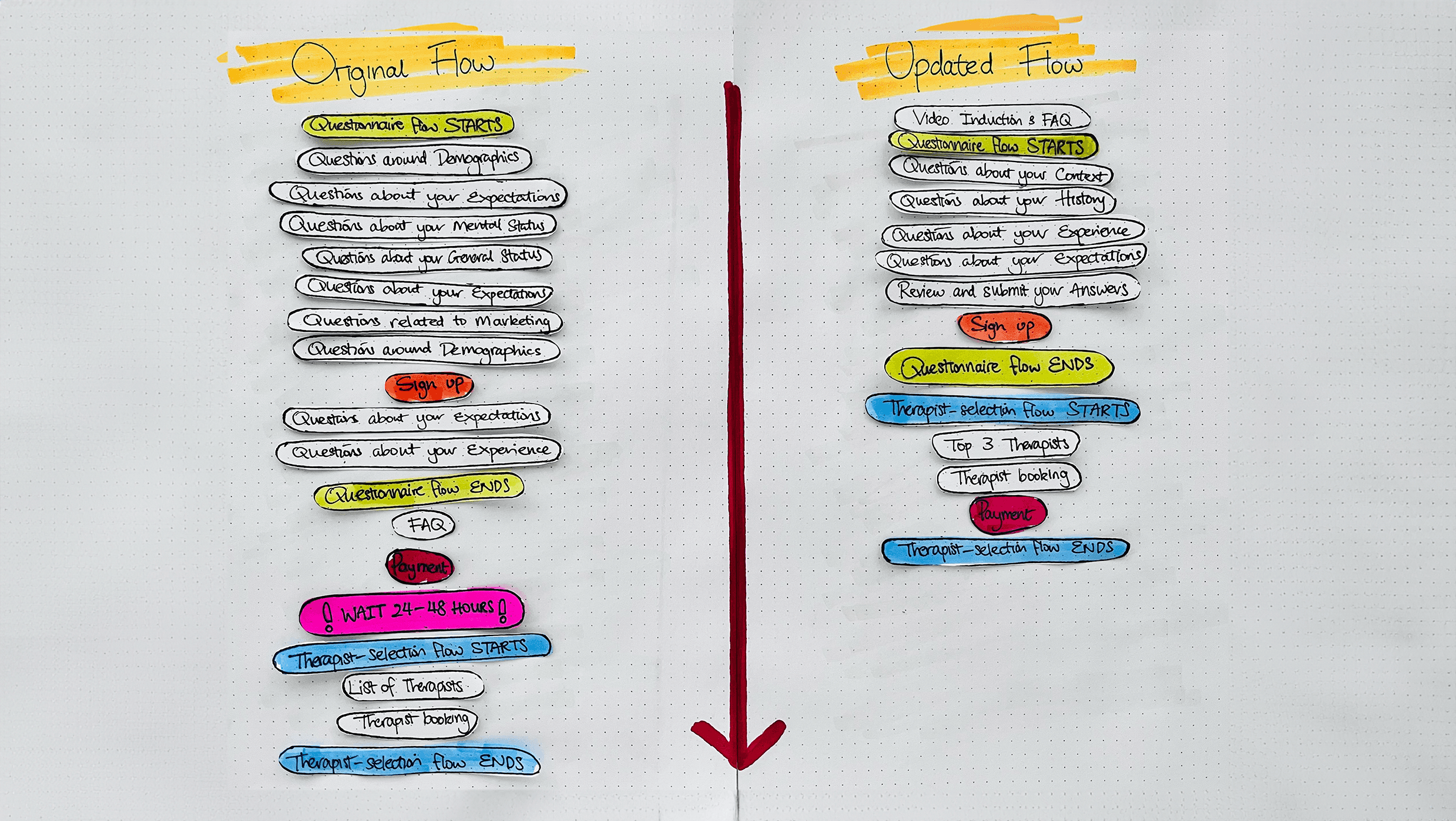
The updated flow is not only more efficient, but better manages user expectations, reducing likelihood of dropping out.

The updated flow is not only more efficient, but better manages user expectations, reducing likelihood of dropping out.

The updated flow is not only more efficient, but better manages user expectations, reducing likelihood of dropping out.

The updated flow is not only more efficient, but better manages user expectations, reducing likelihood of dropping out.

The updated flow is not only more efficient, but better manages user expectations, reducing likelihood of dropping out.
Improving User Flow
Now
Patients are matched within minutes and pay only when they book
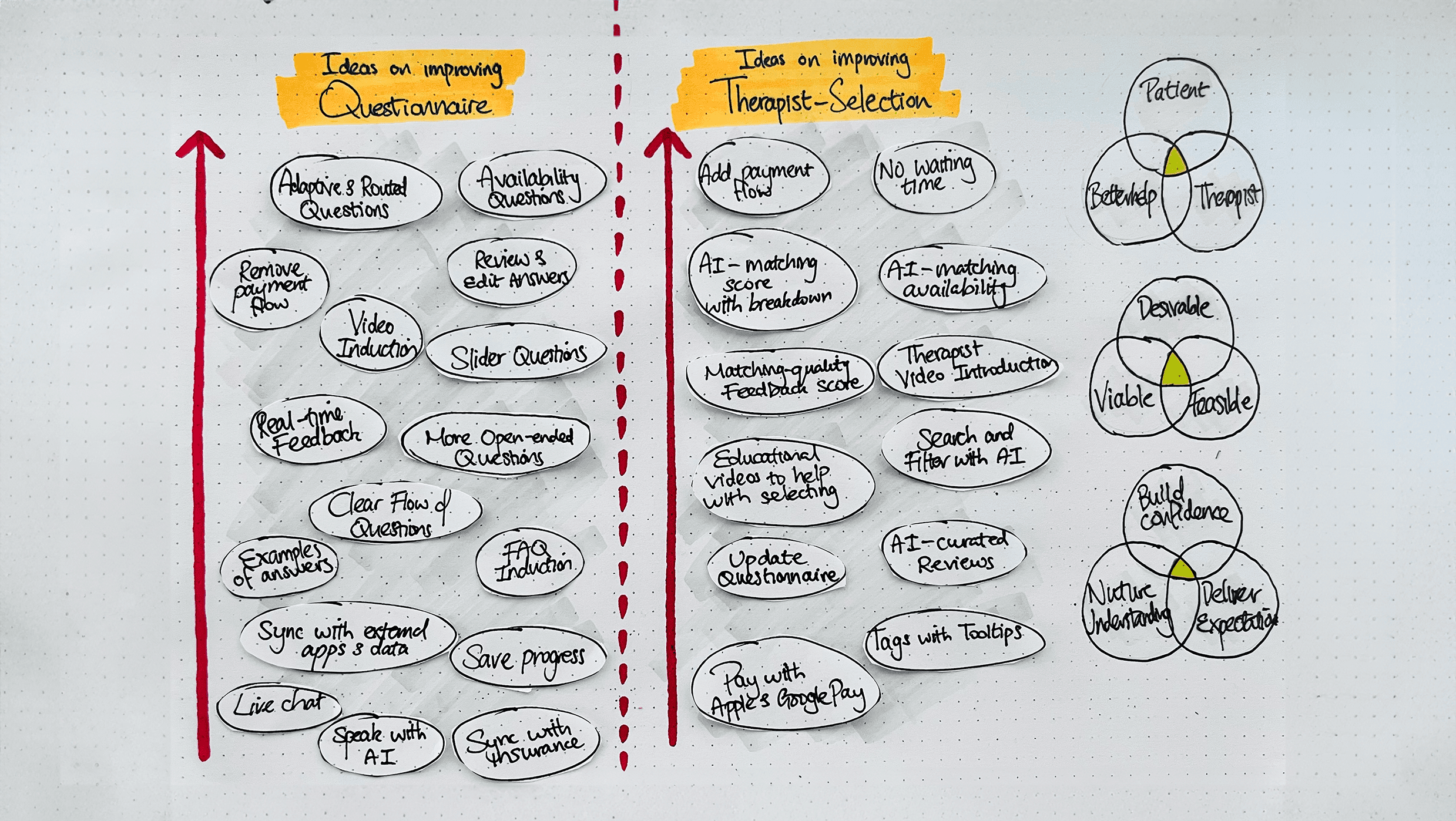
This helped prioritise ideas based on the user persona

This helped prioritise ideas based on the user persona

This helped prioritise ideas based on the user persona

This helped prioritise ideas based on the user persona

This helped prioritise ideas based on the user persona
Ranking Ideas
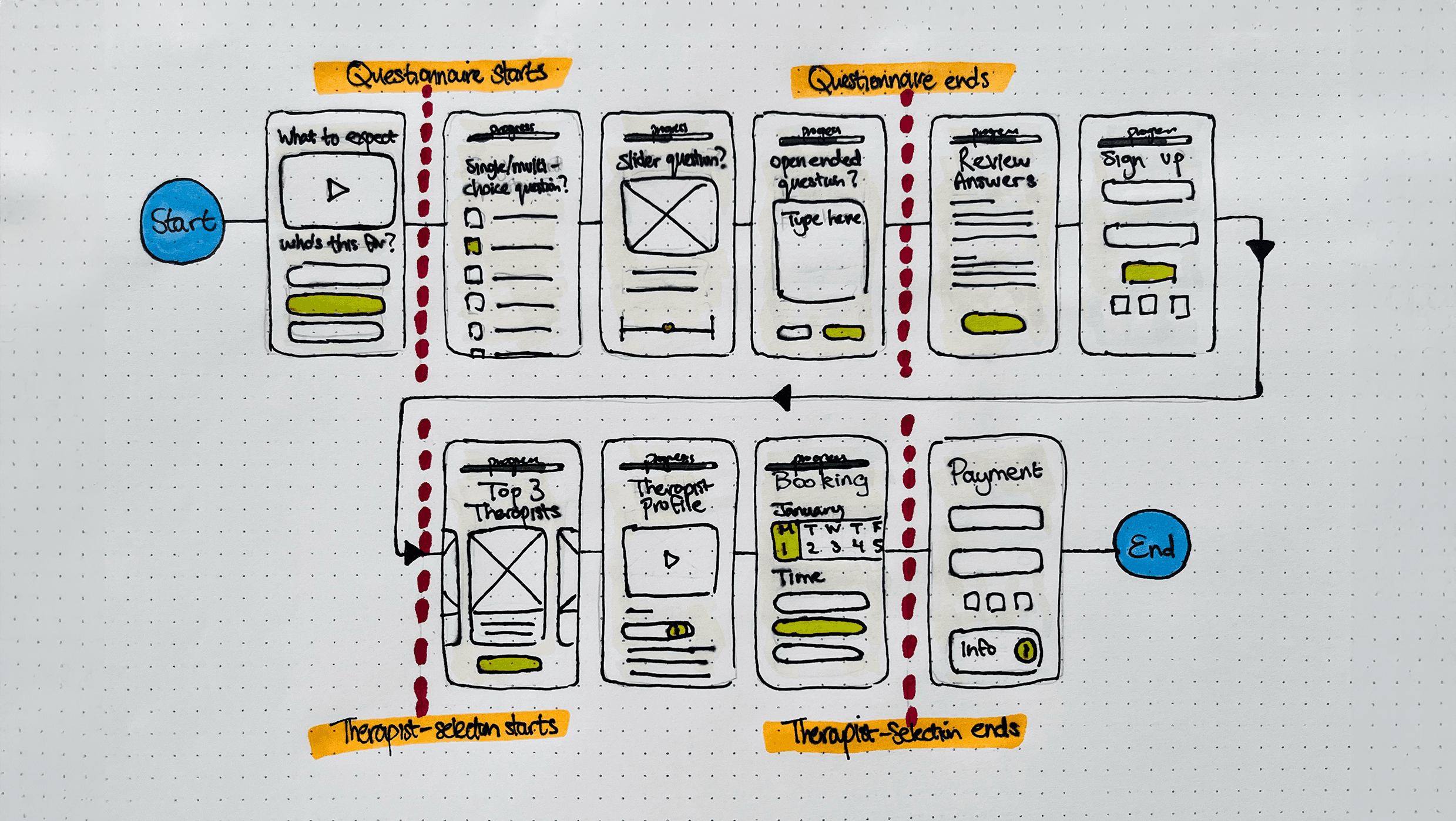
This helped bring the user experience to life

This helped bring the user experience to life

This helped bring the user experience to life

This helped bring the user experience to life

This helped bring the user experience to life
Prototyping User Flow
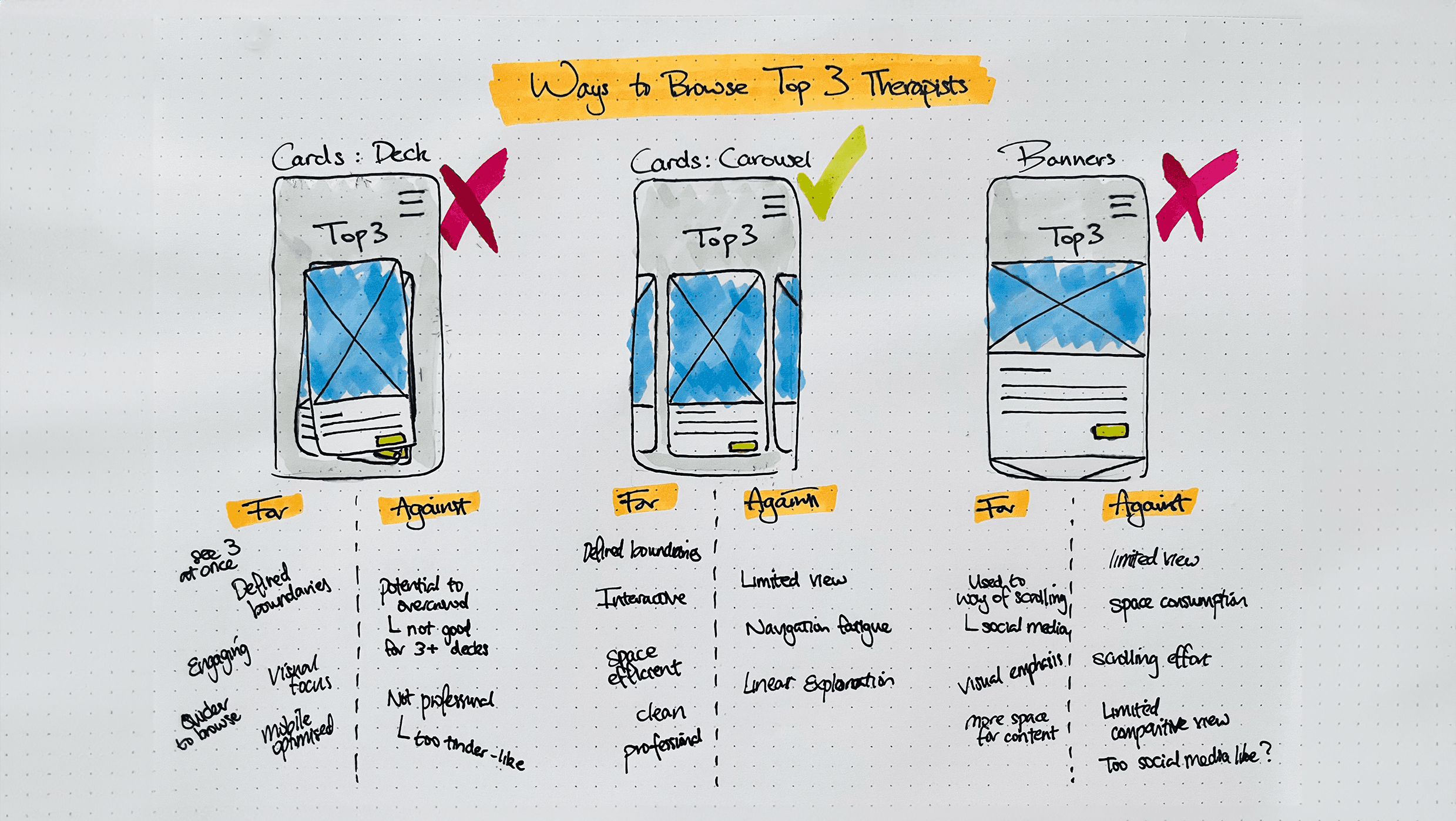
This helped sharpen designs to create a user-friendly experience

This helped sharpen designs to create a user-friendly experience

This helped sharpen designs to create a user-friendly experience

This helped sharpen designs to create a user-friendly experience

This helped sharpen designs to create a user-friendly experience
Iterating UI

Desired Outcome
Desired Outcome
Improve
Trust
+
Improve
Clarity
=
=
Managed
Expectations
Managed
Expectations
Hypothesis: By better managing expectations before the first session, first-time patients are less likely to drop out after one session.
Hypothesis: By better managing expectations in the first place, users are less likely to drop out after one session.
Comparing Designs
Comparing Designs
Before vs. After
Unclear Sections
Why it matters: Poorly defined questionnaire sections create confusion on what to expect
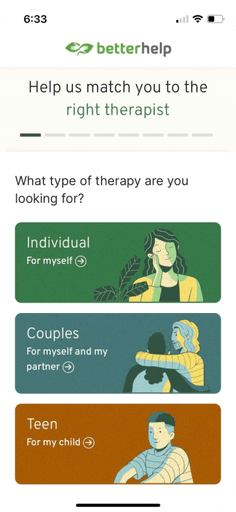


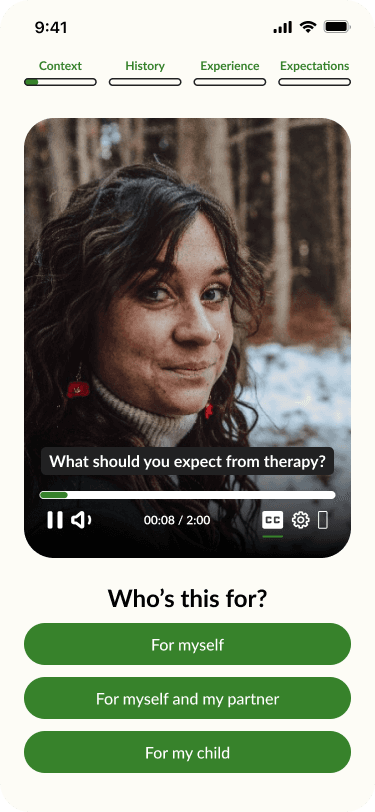
Labelled Categories
Benefit: Clarity on questionnaire process
Video Induction
Benefit: Clarity on what to expect out of therapy sessions and the matching-making process
Unavailable
Why it matters: Patients' inability to convey their availability leads to long-term scheduling conflicts in therapist matching



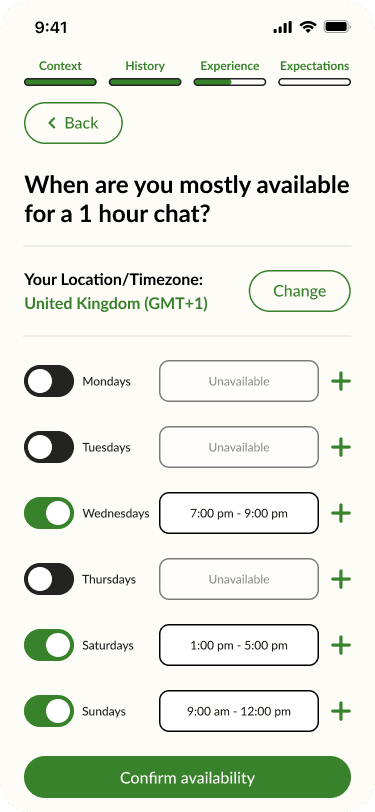
Aligning Availability
Benefit: Matching patient availability with therapist schedules reduces long-term scheduling conflicts and disappointment
Lack of Personalisation
Why it matters: Patients' inability to prioritise their needs leads to inaccurate therapist matching
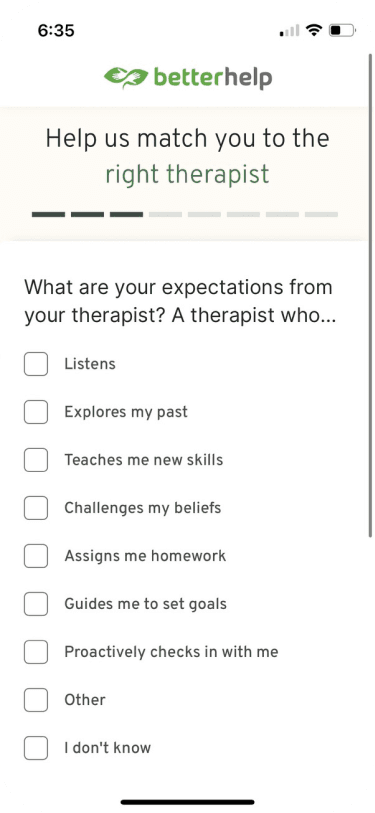


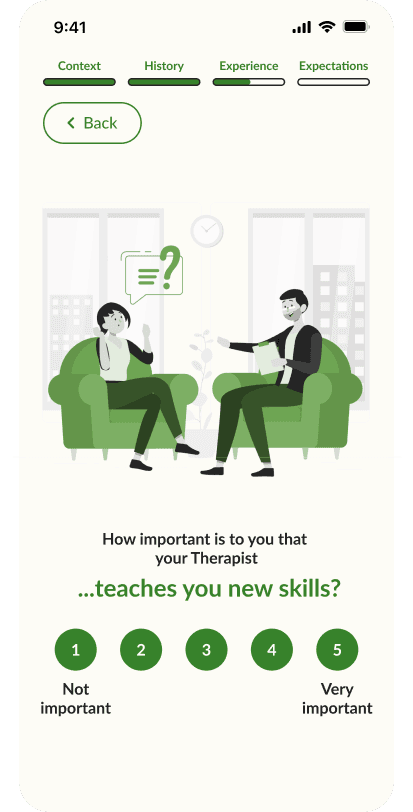
Prioritised Values
Benefit: Understanding which personality traits in a therapist are most important to patients aids in managing their expectations
Unavailable
Why it matters: Patients' inability to review, edit, or update responses over time leads to outdated information affecting therapist matching



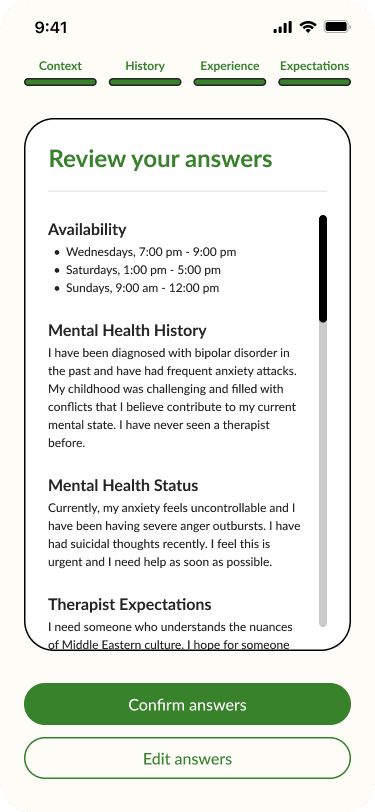
Review & Update
Benefit: The clear profile summary, with options to edit responses and add questions, better manages expectations and improves match accuracy
Long Waiting Time
Why it matters: Patients pay upfront and wait up to 2 days without knowing who they are matched with - raising expectations and optimism bias
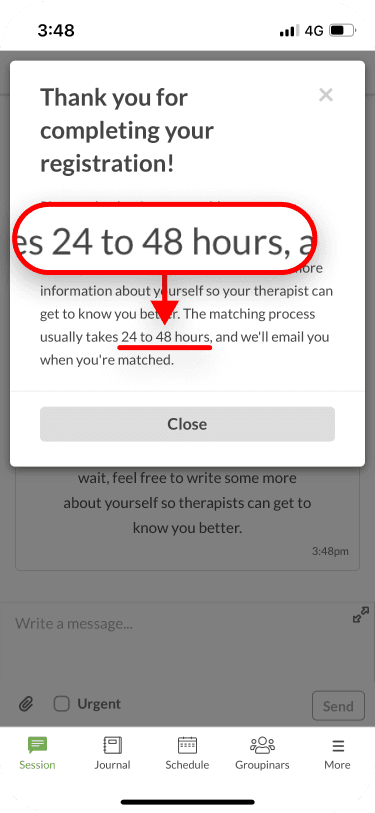



Matched in Minutes
Benefit: Matched within minutes—without pre-payment—enhances trust, reduces anticipation, and lowers the chance of disappointment
Unavailable
Why it matters: Patients receive no help in choosing the right therapist, leading to diminished confidence and a higher risk of disappointment




Top 3 Only
Benefit: Patients are less likely to feel overwhelmed, reducing the likelihood of dropping out due to choice overload
Matchmaking Guidance with AI
Benefit: AI-guided matchmaking, which assists in comparing options, helps patients achieve clarity and confidence in their choices
Unavailable
Why it matters: Patients receive matches without any explanation of the matching process, resulting in diminished trust and an increased likelihood of disappointment



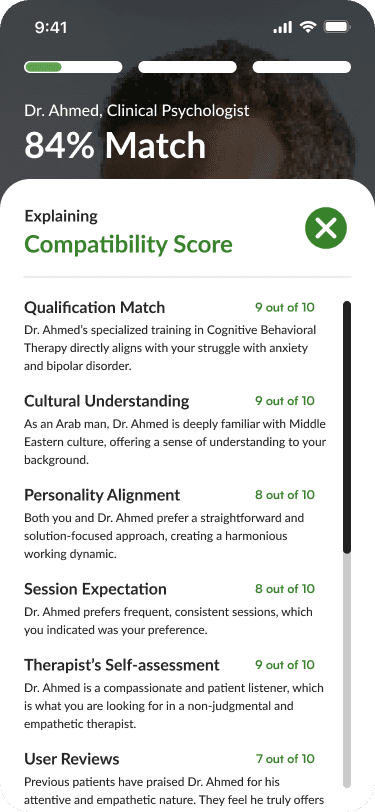
Clarifying Scores with AI
Benefit: Transparency on matchmaking scores that depend on your previous answers promotes understanding and confidence in the process
Cluttered Profile
Why it matters: The dense, jargon-filled profiles with irrelevant information confuse patients and erode trust
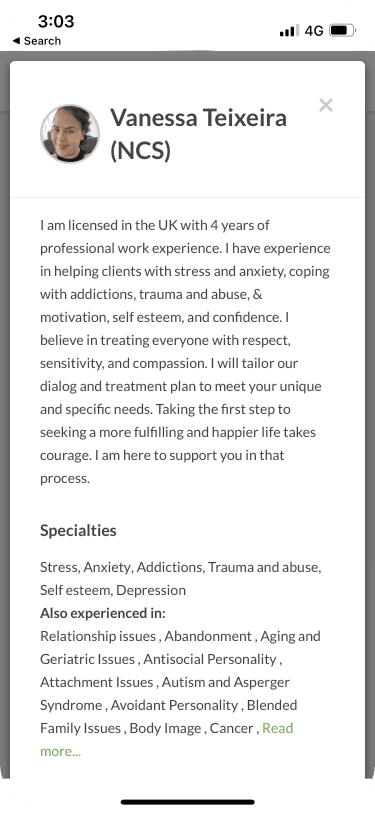


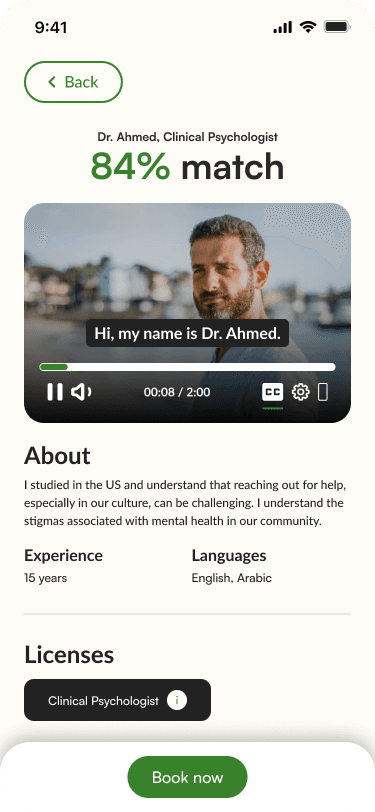
Video of Therapist
Benefit: A video in the profile provides a personal glimpse, enhancing understanding of the therapist's personality and fostering better rapport and trust
Irrelevant Reviews
Why it matters: Impersonal and contextually irrelevant reviews diminish patient confidence
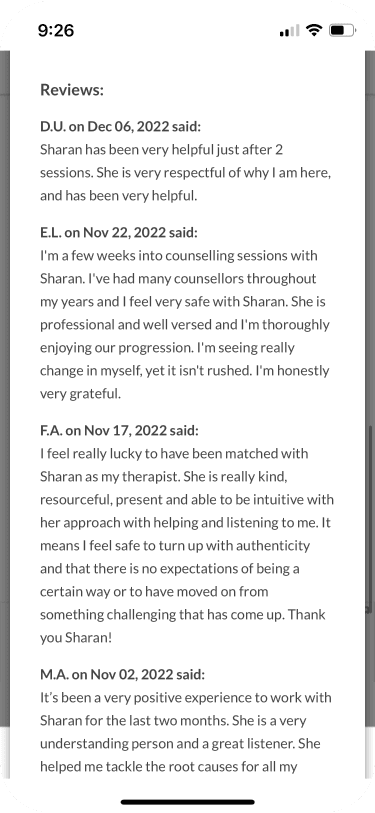


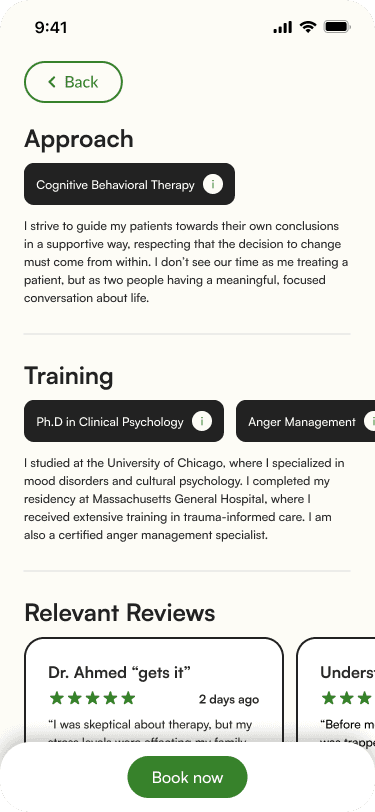
Relevant Tags
Benefit: Displaying relevant tags tailored to patient profiles and clarifying their terminology boosts confidence and trust
AI-Curated Reviews
Benefit: AI analysis presents only patient-relevant reviews, clarifying expectations and fostering trust
Unavailable
Why it matters: Failing to explain therapy styles creates uncertainty, making it harder for patients to set appropriate expectations



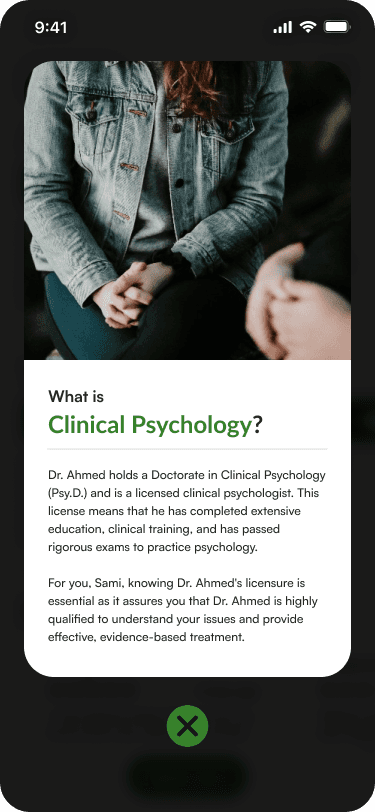
Clarifying Terms
Benefit: Transparency and clarity on therapeutic approaches sets expectations and fosters confidence


Feedback
Feedback
"Kelvin has the key characteristic that I've found is hard to coach into a high potential candidate (curiosity). When walking through his case review, it became clear that even without direct access to member interviews or internal details he was able to empathize and put himself in the member's shoes. He quickly created an inventoried list of possible issues with hypothesizes of how to address these gaps and any downstream impacts to the member experience of these updates."
- Suprano, Product Manager at Headspace
"Kelvin has the key characteristic that I've found is hard to coach into a high potential candidate (curiosity). When walking through his case review, it became clear that even without direct access to member interviews or internal details he was able to empathize and put himself in the member's shoes. He quickly created an inventoried list of possible issues with hypothesizes of how to address these gaps and any downstream impacts to the member experience of these updates."
- Suprano, Product Manager at Headspace
Testing
Testing
Testing
"Being able to pay AFTER I get to see my list of Therapists gives me greater confidence that I'd be matched with a more appropriate Therapist. Betterhelp's original version feels like they're keeping their cards close to their chest, whereas your version is more transparent in showing what you have upfront."
- Reece, 30, UK
"Being able to pay AFTER I get to see my list of Therapists gives me greater confidence that I'd be matched with a more appropriate Therapist. Betterhelp's original version feels like they're keeping their cards close to their chest, whereas your version is more transparent in showing what you have upfront."
- Reece, 30, UK
"Being able to pay AFTER I get to see my list of Therapists gives me greater confidence that I'd be matched with a more appropriate Therapist. Betterhelp's original version feels like they're keeping their cards close to their chest, whereas your version is more transparent in showing what you have upfront."
- Reece, 30, UK
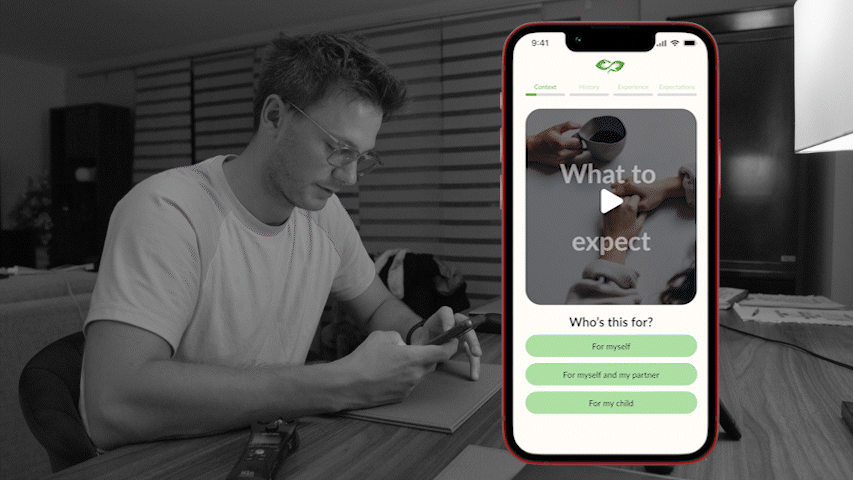

Learnings
Learnings
This project taught me the importance of managing expectations when it comes to reducing dropouts. I learnt that it was important to design solutions that foster trust, clarity, and confidence.
Limitations/Improvements:
- Usability testing on more first-time Patients, measuring difference in drop-off rate, and card sorting exercises to refine the flow and design
- Improve questionnaire for Therapists as well
This project taught me the importance of managing expectations when it comes to reducing dropouts. I learnt that it was important to design solutions that foster trust, clarity, and confidence.
Limitations/Improvements:
- Usability testing on more first-time Patients, measuring difference in drop-off rate, and card sorting exercises to refine the flow and design
- Improve questionnaire for Therapists as well